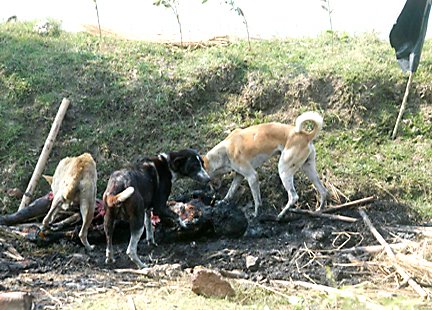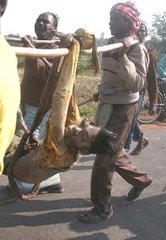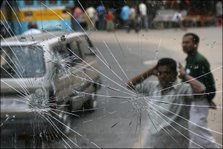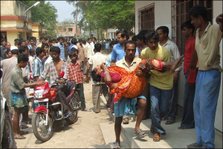Challenging the current development paradigm - A Discussion Paper from Mazdoor Mukti
March 29, 2007
Issued for discussion and dialogue by Mazdoor Mukti
Know at the outset that the “we” on whose behalf this proposal is being submitted refers to ordinary people, ordinary labourers, employees, students, youth; who are born with no form of connection with any Establishment, who toil and perish; who at most cast votes during elections, apparently to chose our rulers, but are not involved at any stage of national planning; who are not ministers, nor bureaucrats, nor police chiefs, nor leaders of parties engaged in parliamentary politics; not even promoters-contractors-order suppliers who mill around ministers and bureaucrats; not eminent citizens who wine and dine with capitalists as part of the same elite, bonded socially, culturally and economically in multifarious ways. Simply put, we are those who have no say in how present day society runs or will run. And nor are we among those who are drugged on the belief that capitalism is indeed the last word, and so have pledged to take responsibility for finding solutions to all problems within its given framework. There is another way in which this proposal can be viewed: it is the only rational stand of all exploited-oppressed-persecuted people fighting consistently against the onslaught of capitalism.
All sensitive and conscientious people in West Bengal unanimously condemn the exceedingly undemocratic, inhuman and anti-people process by which thousands of acres of land is being acquired for industry, evicting lakhs of farmers and labourers from their homesteads and livelihoods. But when the Left Front points an accusing finger at these protesters, calling them anti-development, anti-industry and therefore obstructing progress with deliberate intent so that the state remains backward forever – differences of opinion arise within the dissenting camp regarding the response to these accusations. Such differences are but natural since their politics and ideology are not identical. Be that as it may, let us clarify our own stand on this issue.
They say that acquisition of this land is an urgent necessity for industrialisation. Rubbish. Industrialisation does not mean opening one factory. Industrialisation means factory after factory, a barrage of enterprise. That this is not possible at this critical juncture of crisis-ridden capitalism has been admitted by the proponents of industrialization themselves. A natural question that arises of course is: If industrialization is truly on their agenda, why are thousands of factories still closed? Why is no effort being taken to revive them? That we have to accept the dislocation of thousands of lives for the sake of this so-called industrialization, is exactly the kind of argument we find totally unacceptable.
Because, very simply, industrialization or development, whatever they choose to call it, it’s all inspired by capitalism really, all for the benefit of capitalists, and nothing else. Even the roadways and infrastructure they build, the schools, colleges and hospitals, are all for the benefit of capitalists. To ensure a regular supply of various types of employees and workers, and thus keep their chariot-wheels well-oiled. The greatest example of this is the British colonial enterprise in pre-independence India when many such development projects flourished. Even their biggest supporters cannot claim that such projects were implemented for the benefit of the subject people. Now the problem is that continuous unplanned urbanization and indiscriminate proliferation of industry has brought the country to such a pass that any large development plans necessarily entail displacement and deprivation of livelihood of lakhs of people, and massive environmental degradation.
Having created such an impasse, they are now proposing that we should be ready to make sacrifices for the sake of industrialization and progress! We reject such a proposal with disdain. Whenever the rulers are faced with irresolvable problems which they themselves have created, they shift the onus of finding a solution on the suffering masses. And some among us fall into this trap and come forward with constructive plans. Some even glorify such a stance as ‘participatory democracy’. Let us give a few examples to illustrate this.
Example 1:
When the streets of Kolkata were being cleared of hawkers, citizens were asked whether they wished to walk freely and safely, or would they rather allow the hawkers to remain on the footpaths and obstruct free movement? Well firstly, the hawkers have come there through no fault of their own, nor any fault of ours. It is the direct fall-out of the development and industrialization model adopted by the rulers that has increased unemployment and lay-offs.
Thousands of people chose street hawking as a means of livelihood; and the government being unable to provide jobs, had accepted it perforce. Now, after 30-40 years, it seemed to have discovered that the footpaths had to be cleared for the convenience of citizens, so an attempt was made to turn the citizens against the hawkers. As if the hawkers were not citizens too. In any case, when we are asked what other option the government had other than evicting the hawkers, we have to answer that we want both. We wish to walk freely and safely, and we want the livelihood of hawkers to be safeguarded too. Those who have created this dilemma must find a solution themselves.
Example 2:
In the most recent cases of eviction from land, the argument they have put forward is that factories cannot be built on air, therefore, for the sake of industrial development, there is no other alternative to land acquisition. This time, the options are being placed before us thus: If you are in favour of development, you must condone the eviction of farmers and agricultural labourers from their established source of livelihood. If you oppose this, then you are against progress, you are enemies of the people. Wonderful! And remarkably, when some who are opposed to eviction try to put forward constructive advice, their proposed solutions turn out to be equally problematic. For instance, take only single crop land not multicrop land, they suggest. Who gave them the right to issue such an open license to the government we wonder? Did they not consider the fact that the land is not their very own private property? That thousands of people would be dispossessed and deprived there also? Besides, why is such agricultural land not being upgraded to give better yields? Moreover, in Singur you might say don’t take this piece of land, take this other. But when it comes to Nandigram or elsewhere, will you be able to point out 30-40 thousand acres of any alternative site? As responsible citizens, are you willing to mark out any alternative site for such a devastating project as a nuclear power plant in Haripur? If we study development paths being followed in different countries around the world (accepting industrial growth as a subset of development) we can see that development has many faces:
Development that takes place as a matter of day to day routine, which has no negative impact, which in fact we reap side-benefits of, as ordinary people. We don’t worry our heads about such things. We don’t oppose them, nor do we make a big song and dance over them. Things such as road construction, new bus routes or increase in the number of buses, new schools-colleges-hospitals, even new factories fall under this category.
Development by virtue of which large sections of people are displaced and/or deprived of their livelihood. For example the urban slum clearance drive that has been going on for some years, and the virtual requisitioning of farmland which has started recently, throwing village after village in dire distress.
Development that people fight for and achieve. Somewhere a hospital, somewhere a school, or roadways and so on. May be such things did not receive priority in government’s plans or, have been neglected, or have not been in keeping with the immediate needs of capital. We will mark these as our bold rejoinder to capitalism’s onward march. If we do fight and win these little victories, it does not mean that we overcome the limits of capital; but such attacks hinder capitalism’s innate pace and rhythm of growth. (And are therefore a part of the struggle against capitalism.)
On the issue of development and industrialization, our position is clear: When all the resources and wealth come into the collective hands of common people, when the source of inspiration for any development is the human being, then and only then shall we put forward our constructive proposals for industrialization and other such things. At present, you capitalists and your lackeys control politics and the economy; you decide what is to be produced and in what quantities; you budget expenditure on police-army-weaponry; on healthcare, on education, you determine all of this. Under this perspective, when you decide that one or more capitalists wish to build factories, so we must be forcibly displaced from our homes and deprived of our sources of livelihood, such silly and specious arguments we just cannot accept.
We make a humble submission or bold challenge on the issue of industrialization-and-development,. You say that it is for everyone’s benefit that you have made these elaborate plans. Well draw us a road map for the first five years. Show us how this development will benefit every level of society. What percentage of the unemployed will get jobs, what percentage of the hungry millions will get enough to eat, what percentage of the homeless will get a roof over their heads; how many of those who barely survive on the margin of existence, will improve their conditions of living; how many of those presently employed will be assured job security; what percentage will get pure drinking water, what rate of decline will there be in untimely deaths of pregnant women, in infant mortality; what percentage of children will have a chance for schooling, what decline will there be in the percentage of school drop-outs. Etcetera, etcetera.
Along with this, draw a map for 10-15 years, so that we can see clearly how the fruits of development are leading to a more equitable distribution of wealth. Only after we receive such maps, and can witness their effects, shall we think about how genuinely people-oriented your plans really are. Otherwise we take it that your development path will make the rich even richer, leave the poor exactly where they are, waiting like thirsty swallows in indefinite expectation of a few meagre drops from up above. Sorry, we cannot accept such anti-poor, pro-rich programmes as Development.
10 March, 2007
Issued for discussion and dialogue by
Mazdoor Mukti
Contact: Gautam Sen, P-494A Keyatala Road, Kolkata
700029Z Phone: 2465 2507
sengautam@hotmail.com












1 comment:
Hawkers have a right to hawk on streets where we pay taxes and they do not. They use illegal LPG burners which can burst and cause death. Do you care?
Nandigram & Singur - All you are interested in is that the farmers remain poor and illeterate. You had 50 years to improve their lot - you did nothing. Let industry improve them. Problem is that with money, these poor farmers will no longer remain poor, and with education they will no longer be blinded by your propaganda - hence you guys industrialization.
Please go back to your jungles and live among the monkeys. You have no place amongst the civilized world.
Post a Comment